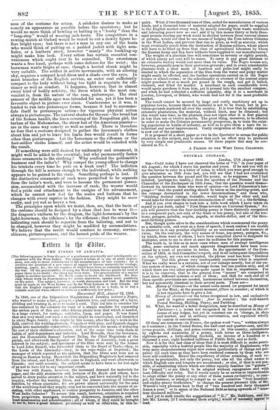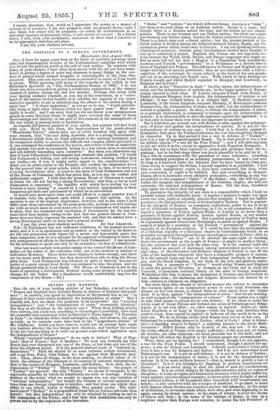DECIMAL COINAGE.
London, 17th August 1865.
Six—Until today I have not observed the letter of " G." in your paper of 4th August ; for which I crave his pardon and yours. If he and you will do me the favour to refer to a letter of mine, to which you were good enough to give admission on 16th June last, you will see that I had not overlooked the question between the pound and the penny, as he supposes. But I had inferred, (perhaps too readily,) from the speeches of the Premier and the Chancellor of the Exchequer on 12th June, that the question would thence- forward lie between those who were of opinion—in Lord Palmerston's lan- guage—" that the pound sterling should be taken as the starting-point, and the coinage decimalized in the lower denominations," and those who, "thinking decimal coinage desirable, would begin at the other end, and would take for their unit the lowest denomination of coin "—i. e. the farthing.
And if you ever chance to look into a little work which I have taken on myself to put forth, called "First Steps towards an Universal System," &o. you will perceive that the four-farthing penny is there distinctly recognized as a component part, not only of the franc or ten-penny, but also of the ten- franc, patagon, paladin, sequin, pagoda, or double-dollar, and of the thou- sand-farthing guinea.
But, though quite alive to the considerations which recommend the penny as a metallic coin, and even as a form of speech, I must confess I am unable to discover in it, any peculiar eligibility as an universal and sole measure of value. On the contrary, the very names of franc, ten-penny, patagon, &c., by which, from want of others, I have been compelled above to designate its multiples, seem to me to show at since its unfitness for this purpose. The truth is, in this as in most cases where men of average intelligence differ, some confusion and much apparent disagreement have been occa- sioned by a want of precision in terms. In the appointment of the Com- mittee of 1853, in that Committee's report, and in all subsequent disquisitions on the subject, my own not excepted, the phrase used has been " Decimal Coinage." But this phrase very inadequately expresses what is required. What we really want is a revision, not ot our coinage merely, but of our en- tire system of money ; of which coinage forms but one portion only, and of which there are two other portions quite equal to this in importance. For it is to be observed, that in the general term " money " are comprised at least three different systems or sets of ideas ; and that for each and all of these specific provisions are needed, harmonious indeed between themselves, but not necessarily identical in their several parts. These are—
let. Money of Coinage—or the actual coins issued (or prepared for issue) by the Mint; at the present moment.fifteen in number ; of which it is not requisite here to give a list.
2d. Money of Account—or the terms recognized in law, and exclusively used in regular accounts ; four in number ; the well-known Pound Sterling, Shilling, Penny, and Farthing.
3d. What, for want of a better designation, may be described as Money of Parlance—i. e. terms not recognized in law or entered in the co- lumns of any ledger, but yet in constant use on 'change, in shop and market, and in ordinary conversation, and regulated wholly by custom or convenience. Of these are instances—in France, the spoken word "sou," written always as 6 centimes; in the United States, the half-cent and quarter-cent, and the terms pounds, shillings, and pence currency ; in this country, calculations by eighths and sixteenths of a penny, such terms as three-halfpence, eighteen-pence, a forty-shilling freehold, an income of a hundred or a thousand a year, eight hundred millions of Public Debt, and so forth.
Now it is for this last class of ideas that it is most difficult to make provi- sion, especially with a bashful people like the majority of Englishmen, who from mere shamefacedness reject new names (particularly of things not pal- pable) till such time as they have been rendered common by those who are more self-confident. Hence the expediency of either retaining, if such re- tention be practicable, not only the penny, but also all the other names to which English ears and tongues are accustomed ; or else, if that is not pos- sible, of substituting others which are either equally familiar (us "guinea" for "pound ") or are likely to he adopted without repugnance and with least difficulty and delay. But it would surely be as unwise as impracticable to adopt either the penny or any other of these names exclusively ; to com- pel, for instance, or attempt to compel us to call ourselves "four-hundred- and-eighty-penny freeholders," to change the present pleasant title of Mr. Warren's very pleasant book to that of "two hundred and forty thousand francs a year, or to speak of the National Debt as being upwards of nine- teen thousand millions."
And yet to such results the suggestions of "G.," Mr. Rathbone, and the late Mr. Laurie, (if I understand them aright,) would of necessity appear to lead. I repeat, therefore, that, much as I appreciate the penny as a money of coinage or of parlance, I am not prepared, with my present views,—and I also think few others will be prepared,—to admit its desirableness as an universal measure of pecuniary value, or sole money of account. In a future letter, I will, with your permission, endeavour to show what I conceive to be its appropriate function and place. I am, Sir, your obedient servant,

























 Previous page
Previous page